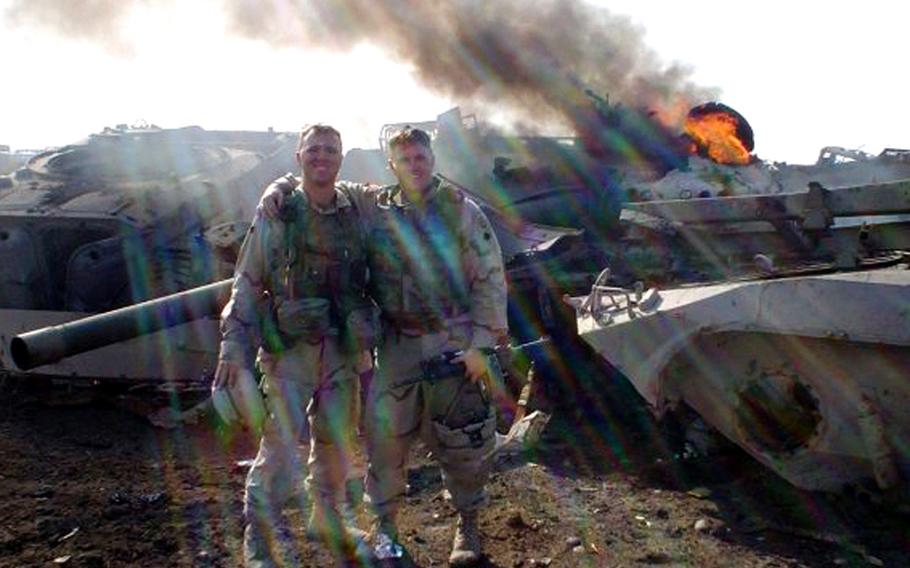
During the Iraq invasion, Stephen Kraft, right, and his Army buddy Clint Auschwitz pose in front of an inoperable tank in an Iraqi junkyard that their unit had just destroyed to keep enemy fighters from using the tank rounds as improvised explosive devices. (Courtesy of Stephen Kraft)
Stephen Kraft walked up the steps of the subway and over to Times Square right as live footage on the JumboTron showed the second plane crashing into the twin towers.
He had been stuck on the E train from Queens for 35 minutes, told only that there was “police activity” at the World Trade Center, and now in the mad crush of panicked people, he was still unsure of what, exactly, had happened.
“Surreal is a good way to put it,” Kraft said. “I just didn’t know what to think.”
People were flooding out of the MTV building where he worked as a benefits administrator in the human resources department. Kraft wanted to get out of Times Square — a chaotic sea of people on even a normal day — and started walking toward the East Side. He tried calling his family, but it was impossible to get through to anyone. He stopped at a hole-in-the-wall bar in Midtown Manhattan, the kind where people go to drink at 9 in the morning. With all eyes turned to the news on the TV, he learned that two planes had hit the towers in a terrorist attack. He thought of his sister-in-law, who worked there.
The phone lines had been jammed since he got off the train, but when he finally got through to his mom and learned his family was OK, he told her he was joining the Army.
“We were at war,” he said about his immediate decision to enlist. “I wanted to do my part.”
Three weeks later, at age 28, he was a soldier.
Kraft’s older brother, an Army veteran, had gone with him to the recruiter in his hometown of Bay Shore, N.Y. When Kraft first told his mom his plans to enlist, she responded, “Stephen, don’t do anything stupid,” but she and the rest of his family were ultimately supportive of his desire to serve.
He signed up to be a combat engineer. He wanted to be on the front lines and wavered between engineer and infantryman, but decided it would be “more fun to work with demolitions.”
His friends threw him a huge going-away bash, and he headed off to basic training.
He was stationed at Fort Bragg, N.C., with the 307th Engineer Battalion, 82nd Airborne Division. He was older than the typical private.
“I’d graduated from college, been to work, so I brought certain experiences to the table,” he said.
Two years after joining, he fought as part of Task Force Falcon in the drive to take Baghdad during the Iraq invasion. His unit followed behind 3rd Infantry Division and the armored “Thunder Runs” to take the capital city in April 2003.
The unit battled in the heavily fortified city of Samawah, from which the Iraqi Republican Guard and other fighters were attacking American supply lines. For clearing the city, Kraft said the 82nd’s 2nd Brigrade earned the Presidential Unit Citation, the highest unit award for valor in the U.S. military.
During one mission, his unit came upon a junkyard filled with abandoned Russian tanks that were inoperable but loaded with highly explosive tank rounds, which could be pilfered to create improvised explosive devices. So his unit went about destroying the tanks and “got pretty creative” in doing so, Kraft said. He has a picture of himself and good friend standing in front of a flaming tank.
“The funny part came about 20 seconds later when it started cooking off rounds and we went running,” he said.
By the time Kraft was fighting in the Iraq War, his service was “less about 9/11 and more about just doing my job as a soldier,” he said.
Kraft got out as a specialist after his three-year enlistment was up, and he wonders whether he should have pursued a career in the Army.
“That’s the only question on the table: coulda, shoulda, woulda,” he said.
His age played a factor in his decision to return to civilian life in Brooklyn.
The Army is “a young man’s game,” he said.
But he is still connected to the military, helping veterans find employment through his job at the Wounded Warrior Project in New York City.
“I really love the mission. I feel like I can make a difference,” Kraft said. “I like being part of this organization to just give back to my fellow veterans.”
mccloskeym@stripes.osd.milTwitter: @MegMcCloskey